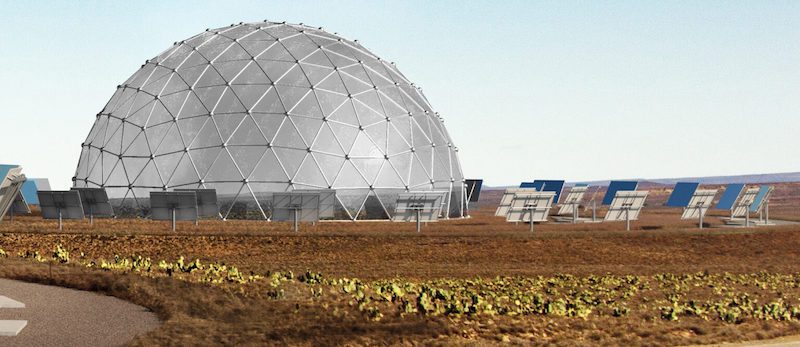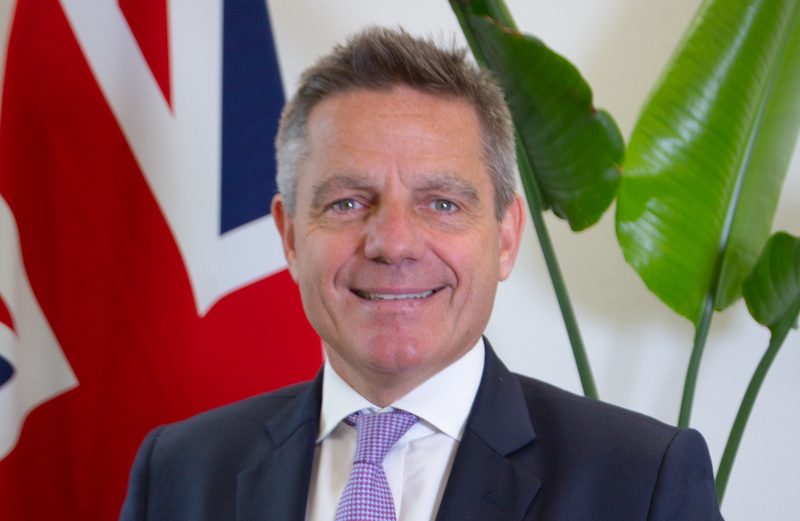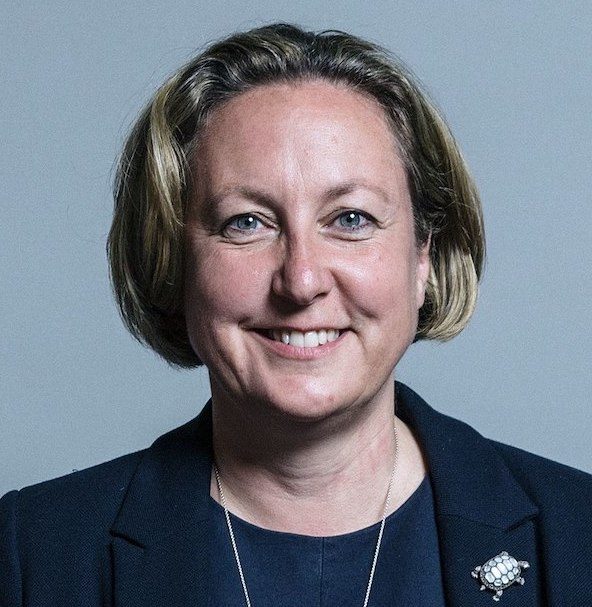- Analysis
From chocolate to solar power, the UK-GCC trade deal is a winner
 Reuters
Reuters
- UK exports to Gulf expected to grow 35% by 2035 to $976 billion
- Sharing renewable energy expertise helps Gulf decarbonise
- Lowering of tariffs on goods helps keep costs down for consumers
- UK firms have £13.4bn invested in GCC, GCC firms £15.7bn in UK
A trade deal between the United Kingdom and the Gulf region has the potential to support jobs “from Dover to Doha”, while building vital green industries and supplying innovative services to the GCC.
That’s according to UK Trade Secretary Anne-Marie Trevelyan, who today launched free trade negotiations with the Gulf Cooperation Council, made up of Bahrain, Kuwait, Oman, Qatar, Saudi Arabia and the UAE.
Equivalent to the UK’s seventh largest export market, the GCC bloc’s demand for international products and services is expected to grow to £800 billion ($976 billion) by 2035, a 35 percent increase – opening huge new opportunities for UK businesses.
- A UK recession may spook Arab investors – or present an opening
- UK and UAE are powering the global energy transition
- Trade commissioner: UK and GCC have endless opportunities
According to the UK, a free trade deal would also open the door to increased investment from the Gulf, supporting and creating jobs across the country.
The talks are expected to culminate in a trade deal worth £1.6 billion more a year to the UK economy, an increase of 16 percent, government analysis shows.
Around 10,700 small and medium-sized businesses from every UK nation and region exported goods to the GCC in 2020, with SMEs accounting for more than 85 percent of total UK goods exporters to Qatar, Saudi Arabia and the UAE.
Bradley Jones, executive director of the UAE-UK Business Council, told AGBI: “A free trade agreement between the UK and the GCC will be hugely beneficial for both markets.
“While the removal of tariffs is important, it is the dismantling of non-tariff barriers that present the strongest opportunity.
“Both the UK and the GCC markets are diversifying and decarbonising their economies, innovating and supporting the developing of new technologies, and investing in skills so that they can deal with present global challenges and work together to seize the opportunities of the future.”
RenewableUK’s CEO Dan McGrail agreed, saying: “The global transition to clean energy includes countries throughout the Middle East which are seeking to make the most of their excellent renewable resources such as solar and wind.
“As a global leader in wind, marine energy and green hydrogen, we’re perfectly placed to help other countries to accelerate their efforts to decarbonise their energy systems – and to boost our own economy by exporting around the world.”
Last week, the UAE-UK Business Council hosted a summit in Aberdeen aimed at identifying opportunities for collaboration between the two countries in the energy transition sector.
Taking place midway between CoP26 and CoP28, it focused on three key issues including the reskilling of the workforce and financing the energy transition.
Luxury homes
The trade deal talks were announced on the same day that real estate consultants Knight Frank revealed that there has been a noticeable surge in UK property interest from Gulf-based buyers following after the pound sterling sank to its lowest level against the dollar since March 2020 last week.
Middle Eastern buyers have long been synonymous with purchasing luxury homes in some of the UK’s most elite postcodes, with prime central London being the sweet spot for Gulf investors.
 Creative Commons
Creative CommonsHenry Faun, partner and head of private office at Knight Frank Middle East, said: “For second homes in the UK, Gulf owners are driven by the ease of language, short travel time, transparent legal system, strong educational offering and attractive lifestyle that the UK, and specifically London, offers.
“A trade deal would only bolster the strength of the relationship between the Gulf and the UK.
“For investment property, both commercial or residential, a trade deal between the UK and GCC may assist capital flows in both directions to and from the Gulf.
“The UK and specifically the central London market remains key in the portfolios of our Gulf-based clients.
“The weaker pound sterling combined with the ease of travel this year has assisted our high net worth clients with their acquisition decisions.”
Green innovation
Raghu Mandagolathur, CEO, Marmore Mena Intelligence said the trade deal is likely to focus on reducing tariff and non-tariff barriers while the GCC could focus on increased investment flows into non-oil sectors.
“A comprehensive free trade agreement between the six GCC nations and the UK would be a milestone,” Mandagolathur said.
“Some goods imported by the UK from the GCC include mechanical power generators, ships, jewellery, telecom and sound equipment, while major exports from the region to the UK are oil and gas.
“With the UK reporting a trade surplus, the FTA is likely to focus on reducing tariff and non-tariff barriers while the GCC is likely to focus on increased investment flows into non-oil sectors.
“Lowering tariffs on goods imported from the UK such as on cereals would help reduce costs for GCC consumers.”
 UK Department for International Trade
UK Department for International TradeSimon Penney, Middle East Trade Commissioner for the Department for International Trade (DIT) and Her Majesty’s Consul General to Dubai and the Northern Emirates, said: “Our priority is to focus on maximising the opportunity for economic growth in both the UK and the GCC by making it easier for our businesses to trade with and invest in each other’s markets.
“Both sides are working at pace towards an agreement. We want this to as ambitious and comprehensive as possible, setting a new standard for trade and investment between Gulf countries and the UK.”
He added that the sectors of opportunity are those that are priorities in the Gulf Vision strategies and align with the UK’s strengths – technology, cyber, life sciences, education, AI, financial services, renewable energy and creative services.
Stephen Phipson, CEO of Make UK, the manufacturers’ organisation, was also positive about the trade talks.
“We welcome the launch of free trade negotiations, strengthening trade opportunities which will ensure that British manufacturing benefits from future positive flows of goods and services into the Gulf region,” Phipson said.
“It is also extremely helpful that the UK and GCC are committed to work towards seeking the opportunities from ‘green innovation’, which will bring significant opportunities for Britain’s innovative renewable energy companies which are already leading the way in this area of global concern.
“We look forward to working with government to make sure manufacturers large and small are able to benefit from the business possibilities this deal will open up.”
Dr Bhaskar Dasgupta, head of strategic development, MENA, Apex Group, and a former managing director and chief operating officer, UK Export Finance, said: “We see substantial benefits from a free trade deal in goods and services between the UK and the GCC.
“Sectors such as food, manufacturing and intermediate goods will benefit.
“On the services side, with the increase in common law adoption in the GCC, legal services will see a boost while financial services will benefit hugely from the linking of two of the major financial hubs in Europe and the Middle East with increased financing, investments and a focus on new developments in ESG and virtual assets.”
It is the fourth major set of free trade agreement (FTA) negotiations launched by the Trade Secretary this year, following visits to begin talks in India in January, Canada in March, and the launch of negotiations with Mexico last month.
 Creative Commons
Creative CommonsTrevelyan said the UK-Gulf trading relationship was worth £33.1 billion in the last year alone.
“From our fantastic British food and drink to our outstanding financial services, I’m excited to open up new markets for UK businesses large and small, and supporting the more than ten thousand SMEs already exporting to the region,” Trevelyan said.
She said a UK-GCC deal would mean significant benefits for British farmers and producers, as the Gulf is highly dependent on imported food.
British food and drink exports to GCC countries were worth £625 million last year, and a deal could significantly reduce or remove tariffs on UK food and drink exports.
Tariffs that could be slashed include cereals, which currently face a tariff of up to 25 percent; chocolate, up to 15 percent; baking products, up to 12 percent; sweet biscuits, up to 10 percent; and smoked salmon, which has a five percent tariff at present.
Negotiation challenges
According to UK government data, almost £30 billion has already been invested bilaterally between Britain and the Gulf.
GCC investments supported over 25,000 UK jobs in 2019 – a number that tripled over the previous decade – and analysis shows that the East Midlands, West Midlands, North East and Yorkshire and the Humber will be in line for the greatest proportional gains when the ink dries on a new deal.
The agreement would also be estimated to boost the economies of Scotland, Wales and Northern Ireland by almost £500 million collectively.
But the trade deal negotiations may not be straightforward, according to the Law Society of England and Wales.
While welcoming the start of talks, president Stephanie Boyce also highlighted the challenges that negotiators and UK firms face in the Gulf region.
“The different jurisdictions provide varying levels of market access and regulatory regimes for legal service providers,” Boyce said.
“Understandably, there’s no uniform approach to systems of registration or licensing, nor establishment for law firms across the GCC and there are different mobility rights across the region for foreign individuals, given the distinct jurisdictions involved.
“While it’s possible for foreign firms to operate in most jurisdictions, the processes, related costs and language barrier mean that many firms feel they cannot compete on a level playing field with domestic firms in what is often an already saturated market.
She said the Law Society believes that respect for the rule of law goes hand in hand with economic stability and prosperity.
“Human rights challenges do not necessarily mean that the UK should not trade with a particular country,” Boyce added.
“However, as has been the UK government’s previous practice in other jurisdictions, where there are human rights challenges, any trade agreement between the UK and GCC should include an effective clause on the rule of law and protection of human rights.”
One UK entrepreneur looking forward to a trade deal being closed is Sanjay Aggarwal, co-founder and director of Spice Kitchen, which is in the process of identifying retailers in the Gulf to work with.
He said: “We went to Gulfood [in Dubai] with DIT on a research mission and from this we know there is a massive market for our products, like our spice tins and single spice blends in the premium gifting space.
“It’s so important for our business to be linking with the GCC and enables us to grow rapidly in exciting ways we never thought possible.”
The trade deal announcement coincided with the return of Etihad Airways, the UAE’s national carrier, to London Heathrow’s Terminal 4 following a temporary home at Terminals 2 & 3 during the pandemic.
Etihad also confirmed that from July to September it is increasing its current four daily flights from London Heathrow to five.
David Tarsh, managing director, Tarsh Consulting, said: “Dubai has demonstrated how valuable it is to one’s economy to have a hub airport.
“If a trade deal with the UK speeds the construction of a third runway at Heathrow, more flight connections and greater competition on the route, there will be more commerce and the trade deal will be seen to be a success.”
But according to John Grant, chief analyst at OAG and partner of Midas Aviation, aviation is unlikely to play a big part in the trade deal.
“I suspect that it won’t make any real difference,” Grant said.
“The UK has a range of open skies agreements for air services from the Middle East and the major airlines are already maximising out what would be the optimal frequencies of flights.”
In numbers: Britain and the Gulf
- The GCC bloc represents the UK’s seventh largest export market, and total trade was worth £33.1 billion in 2021. Only the US and China buy more UK goods and services
- Government analysis shows that a deal with the GCC is expected to increase trade by at least 16 percent, add at least £1.6 billion a year to the UK economy and contribute an additional £600 million or more to UK workers’ annual wages
- There were around 600 GCC-owned businesses in the UK in 2019, supporting over 25,000 jobs – a number that tripled over the previous decade
- More than 85 percent of total UK goods exporters to Qatar, Saudi Arabia and the UAE are SMEs. In 2020, around 10,700 UK SMEs exported goods to the UAE, 5,500 exported to Saudi Arabia and 4,100 exported to Qatar
- Consumers in the Gulf have significant purchasing power and huge appetite for UK products and services. For example, Qatar is one of the richest economies in the world, ranking ninth globally with a GDP per capita of $53,804 (£41,912) in 2020
- UK firms have £13.4 billion invested in GCC economies and GCC firms have £15.7 billion invested in the UK as of 2020
- The UK is the second largest services exporter in the world and services exports to the GCC were worth £12.1 billion last year.
Register now: It’s easy and free
AGBI registered members can access even more of our unique analysis and perspective on business and economics in the Middle East.
Why sign uP
Already registered? Sign in













